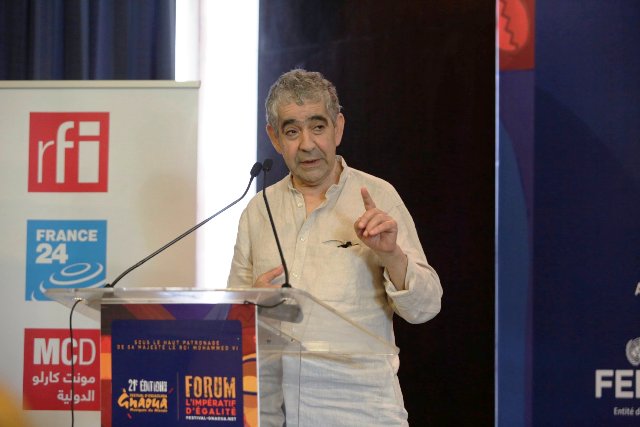Essaouira Human Rights Forum: Gender equality is a priority of the CNDH

Women and men, convinced feminists, from Morocco and abroad, met on 22 and 23 June 2018 in Essaouira to discuss “the necessity of equality” as part of the Human Rights Forum. The National Human Rights Council (CNDH) and the Gnaoua and World Music Festival of Essaouira organized this forum for the seventh time to create a sharing space for national and international stakeholders to discuss gender issues.
Choosing this issue is not fortuitous. Mr. Driss El Yazami, CNDH Chairperson, shed lights, at the opening of this forum, on gender equality as a priority of the CNDH actions. The Council is concerned mainly with this issue first because of its constitutionality, in light of gender-based discrimination that affects several areas and the changes in society that encourage women to claim their full rights. Hence, inevitable transformations and reforms need to be accelerated, stressed Mr. El Yazami.
With the same conviction, Neila Tazi, President of the Gnaoua Festival, highlighted the importance of gender equality and reiterated her commitment, as a Vice- President of the House of Councillors, to increase efforts to implement gender equality approach in all areas.
Academicians, anthropologists, politicians, artists, philosophers and members of civil society from Morocco, Tunisia, Mali, Niger, France and Lebanon denounced the persistent inequalities, while expressing hopes cultivated thanks to existing laws, reforms and their coming and undeniable concretization.
Indeed, this forum was an opportunity to explain the concept of equality, parity and non-discrimination. Mrs. Rabéa Naciri, Member of Advisory Board of the International Women’s Learning Partnership- WLP Network, Morocco, addressed a highly significant inaugural lecture on “Equality and parity: Ensuring equal rights and equity of situations”.
Mrs. Naciri said that there is a conceptual confusion and ambivalence in using these words. It is not a question of academic rhetoric, but it is a question of political challenges. Equality and non-discrimination are inseparable concepts and are two sides of the same arrangement. These two notions are entrenched in several international instruments of human rights. However, parity is the equal distribution, in terms of quantity, between men and women in political areas. Indeed, “confusing equality with parity is a way of avoiding equality which is a “big word””, said, within the same context, Mrs. Genevieve Fraisse, philosopher and historian.

Mr. Mohamed Seghir Janjar, anthropologist, explained the difference between formal equality and substantive equality. He said that the key question is how to ensure that men and women use their rights without reproducing inequalities through the same rights. For example, a salary, albeit received in an equal manner, it is not used in the same manner by men and women.
Analysing the Family Code, Mrs. Malika Benradi, university professor, highlighted the problem of harmonizing the Family Code with the Constitution. The Constitution came up with words like equality and gender -based non-discrimination. She also insisted on contradiction and legal schizophrenia found between the legal arsenal and the respect of the fundamental principles of the Nation. Ambivalence also found in the current Family Code which maintains innumerable inequalities. This Code needs to be reviewed in light of the principles set by the Constitution, confirmed Mrs. Benradi.
Mrs. Khadija Cherif, sociologist and Bouchra Bel Haj Hmida, MP and Chairperson of the Committee on Individual Rights and Freedoms (Colibe), identified several lessons of the Tunisian experience. The Committee report submitted to the president of the Republic of Tunisia, recently, raised claims very high. For example, they called for total equality in inheritance, abolition of death penalty… while hoping for more gains.
Both statements acknowledge progress made in Tunisia in the area of women’s rights. They also believe that efforts must be maintained in order to cope with the growing resistance that is becoming more and more pressing.
At the closing session, Mr. Mohammad Ali Benmakhlouf not only analysed different meanings of equality, parity and gender discrimination, but also reforms, experiences and good practices to overcome injustices against women.
You can review the proceedings of the 7th edition of the Essaouira Human Rights Forum on the CNDH Youtube Channel via the following link:
- Opening session, Opening lecture and 1st round table on “Equality, discrimination and parity: concepts, consequences”
https://www.youtube.com/watch?v=iPSlWWrMeE0&feature=youtu.be%C2%A0%C2%A0%C2%A0%C2%A0%C2%A0%C2%A0
- 2nd round table on ” Undeniable progress, persistent discrimination”
https://www.youtube.com/watch?v=jqVOCwfn7io&feature=youtu.be%C2%A0%C2%A0%C2%A0
- 3rd round table on “Dynamic societies: initiatives for women’s rights”
https://www.youtube.com/watch?v=LGlTFOIjzgg&feature=youtu.be%C2%A0%C2%A0%C2%A0%C2%A0%C2%A0%C2%A0%C2%A0%C2%A0%C2%A0%C2%A0
- 4th round table on “Ways for reform” and Debate conclusions
https://www.youtube.com/watch?v=KK7FcdUm8zE&feature=youtu.be%C2%A0%C2%A0%C2%A0%C2%A0%C2%A0%C2%A0%C2%A0%C2%A0%C2%A0%C2%A0%C2%A0






















